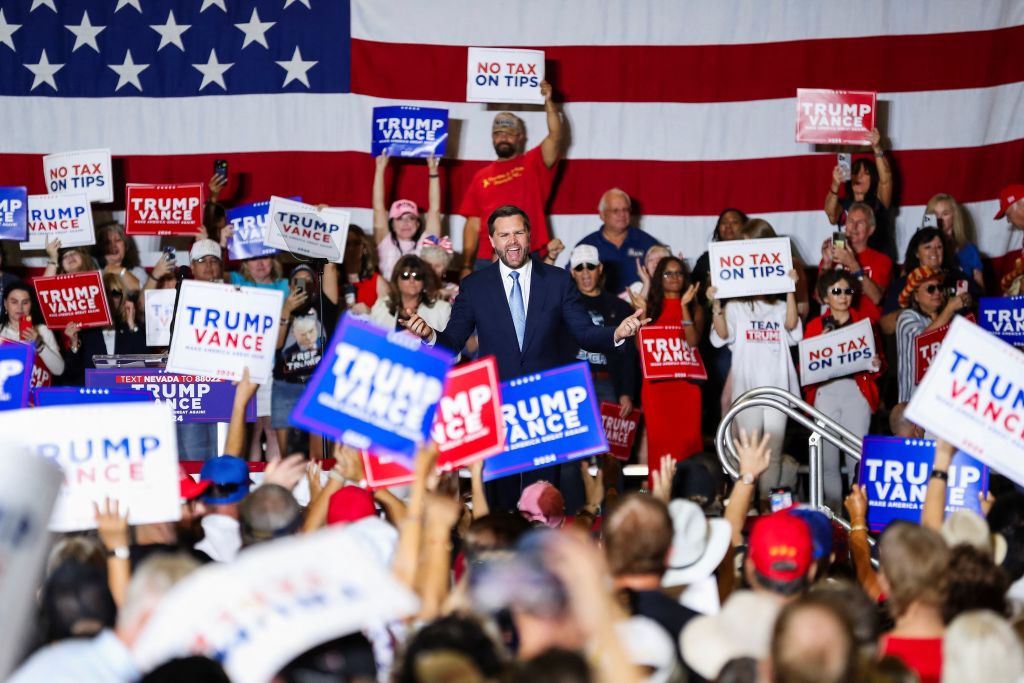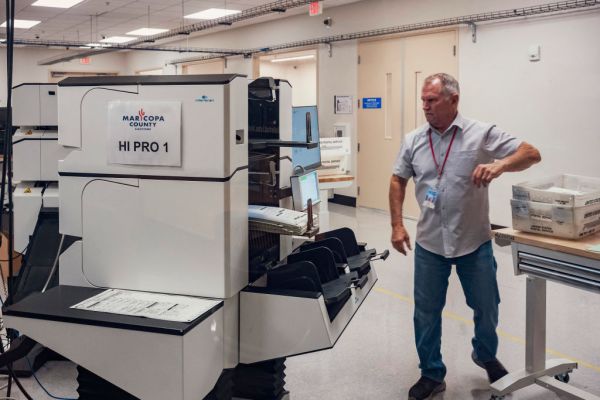Hello and happy Saturday. If you had told 16-year-old me that 2024 me would be working for a politically conservative digital media company, I’d have had a few questions. Starting with, “What does conservative mean?” and “What is a ‘digital media company?’” I had my heart set on being a sportswriter. And I was, for a while. I covered everything from high school golf and cross country to NBA and NFL playoffs and a World Series. My lasting memories are of the busiest times: high school football Fridays, 15-hour days at the Indianapolis Motor Speedway, traveling for the NBA playoffs.
My transition from sports to political journalism was accidental (who could have known that the internet business model of fancy offices with designer furniture and free food and no plan to generate revenue might not work out?), but carrying me through the transition were big events: breaking news, major events, and elections. There’s just a certain energy that helps you power through.
We are now less than two weeks out from a presidential election unlike any in my lifetime. A former Republican president, facing federal criminal charges for his efforts to overturn the last election and who also survived an assassination attempt, is in a dead-heat with a relatively untested Democratic opponent who was thrust into the role after the expected nominee—and incumbent president—left the race over concerns about his age and ability.
It’s a Super Bowl in which more viewers are rooting against, rather than for, one of the teams. But it’s still a Super Bowl.
So I’ve been a little envious of our Dispatch Politics team. David Drucker, Michael Warren, and Charles Hilu have been hitting the swing states hard. This week we had dispatches from Pennsylvania, Michigan, and Nevada. In Michigan, we covered a Barack Obama rally for Harris, noting that the former president is seeking to boost the vice president’s support among men: “Black men in particular appear poised to support Trump in higher numbers than in the past, a possibility Harris is working to countermand.”
Out in Nevada and Arizona, J.D. Vance seemed to be having a grand old time, cracking jokes and exuding confidence. And why not? “In these two battleground states of the Southwest, Trump is narrowly leading Harris in the poll averages: by 1.8 points in Arizona and by 0.9 points in Nevada. Initial returns of early-vote ballots, which registered Democrats have dominated in recent years, now show a Republican edge in both states.”
And then there was Elon Musk’s “town hall” in Pennsylvania, hosted by his own pro-Trump super PAC. As Drucker wrote: “The event did offer a window into the conspiracies—related to the United States government and otherwise—animating Musk’s participation in the 2024 presidential campaign. Not only did Musk, 53, not dissuade audience members who framed questions to him in the form of conspiracy theories, he offered up his own, even in response to relatively straightforward questions.”
We’re now less than two weeks from the election, and we have no idea how it will turn out. But I do know that David, Michael, and Charles won’t be kicking back in their easy chairs anytime soon. Thanks for reading and have a good weekend.
Nearly a month has passed since Hurricane Helene brought sudden and unexpected devastation upon eastern Tennessee and western North Carolina. Michael Reneau experienced the storm firsthand, and he has since been reporting on the recovery efforts in the region. He shares the stories of several volunteers: a Tennessee doctor who set up a free health care clinic in Asheville, North Carolina; a physical therapist who volunteered on a chainsaw gang with fellow members of church working in a few towns to clear debris; a Grammy-winning country performer who helped coordinate resources for his community, and others. He writes about how the isolationism that comes from living in hard-to-reach communities tucked into the Appalachians fosters the independence and self-reliance that was on display in the storm’s aftermath: “The destruction created by Hurricane Helene … is illuminating a resourcefulness that has always been there but hasn’t been needed to this degree for generations,” he writes.
On Tuesday, both the New York Times and The Atlantic published pieces in which John Kelly, chief of staff to Donald Trump from 2017 to 2019, shared stories from his time in the White House. He recalled how the former president struggled to understand that members of the military swear an oath to the Constitution, not the president, and once said that Adolf Hitler “did some good things.” Kelly told the Times that he considered Trump to be a fascist. In Boiling Frogs, Nick notes that Kelly is the third general to use the F-word in describing Trump, and he laments that these revelations are unlikely to dissuade any Trump supporters from voting for him. “They’re not going to fold,” he writes. “They’ve bet too much. They’re going to continue to play this hand no matter how bad it gets.” In the Friday G-File, Jonah doesn’t fault the generals for describing Trump as fascist, because they are qualified and well-suited to make that judgment. But: “The fact that John Kelly or Mark Milley think Trump is a fascist is important not because they used the F-word, but because in their judgment the word is accurate. The problem is that the word is ruined. It’s lost its explanatory and descriptive value thanks to decades of abuse.”
The Democrats got one thing right this summer: They cast aside President Joe Biden after his disastrous debate exposed the extent of his decline and as polling showed he was on track to lose to Donald Trump. But what about the follow-up? Was Kamala Harris the best person to replace Biden as the nominee? Kevin wonders if Democrats might be regretting that choice. Harris is campaigning as though she’s losing, and polling shows the race is a dead heat despite Trump’s increasingly erratic behavior. He acknowledges that subbing in the vice president was in many ways the easiest option but, “The easy thing is not often the smart thing. Democrats right now are feeling a lot of things—and smart is not one of them.” He argues that Harris might have been good at winning races in California, where she was elected as the San Francisco district attorney before becoming the state’s attorney general and later a senator. But that success doesn’t translate to a broader electorate. “Harris was the worst-performing candidate in the 2020 presidential primary—famously not even making it into 2020. And the national Democratic primary electorate, while more moderate than California’s, surely is more sympathetic to Harris’ values and sensibility than the general national electorate is.”
And here’s the best of the rest:
- In Techne, Will writes that we are on the verge of a technological revolution with artificial intelligence, and he compares it to the dawn of the internet in the 1990s. The internet and e-commerce flourished because the government took a light regulatory hand, and he’s concerned that the “techlash” we’ve seen against companies like Google, Facebook, and Apple bodes poorly for AI.
- “Is it a betrayal of mission for Christians of any persuasion or tradition to engage in politics? And is it poisonous for our politics when we do?” Daniel Darling tackles these thorny questions in a very thoughtful essay for Dispatch Faith.
- Israel achieved one of its major objectives with the death of Hamas leader Yahya Sinwar. But what comes next? Charlotte reports on Secretary of State Antony Blinken’s latest trip to Israel to attempt to broker a ceasefire, writing that “U.S. officials hope taking Sinwar out of the equation will give them new room to maneuver for an agreement that makes way for regime change in Gaza.”
- Has it really been 30 years since Pulp Fiction came out? It has. Luis looks back at how the film became a cult classic and made Quentin Tarantino a star. He notes that the film has been criticized for its often gruesome violence, but he argues: “Tarantino repeatedly gives his Pulp Fiction characters the choice to do good when it most counts—and they often do.”
- The pods! The pods! On The Dispatch Podcast, Jamie welcomes Atlantic writer David Frum, a former speechwriter for George W. Bush, to explain why he’s voting for Kamala Harris. If you need a break from politics, check out Jonah’s Remnant conversation with Kenneth Pollack about the tenuous state of the Middle East. Will the 2024 election face as much legal chaos as 2020? If so, Sarah and David are ready. On Advisory Opinions they run through how the election might play out in court.










Please note that we at The Dispatch hold ourselves, our work, and our commenters to a higher standard than other places on the internet. We welcome comments that foster genuine debate or discussion—including comments critical of us or our work—but responses that include ad hominem attacks on fellow Dispatch members or are intended to stoke fear and anger may be moderated.
With your membership, you only have the ability to comment on The Morning Dispatch articles. Consider upgrading to join the conversation everywhere.